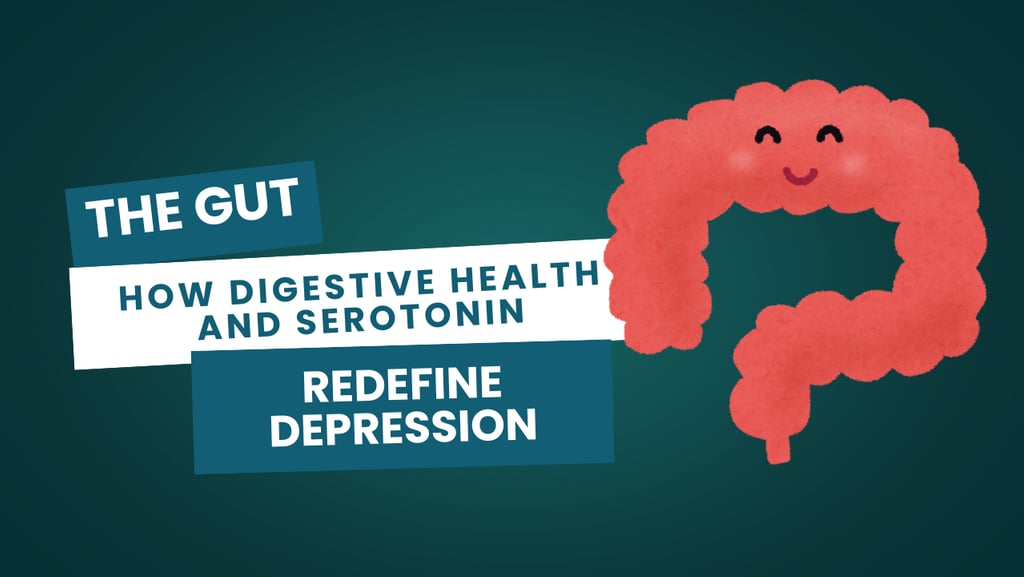The Gut, Your Second Brain: How Digestive Health and Serotonin Redefine Depression
TOP POST
Dr. Carlos Peñaloza
8/22/20255 min read


Have you ever felt "butterflies in your stomach" before a big event? That sensation is more than just a simple metaphor. It's evidence of the deep connection that exists between your gut and your brain. For decades, we've seen the brain as the sole control center for our mood and emotions. However, regenerative science shows us a much more fascinating truth: the key to mental health, and in particular to depression, may lie in the health of our digestive system.
This article invites you on a journey to understand the gut-brain axis, a fascinating two-way communication system. We'll explore how a balanced gut ecosystem is crucial for the production of serotonin, a vital neurotransmitter for our well-being, and how an imbalance can be an underestimated factor in the struggle against depression.
The Gut-Brain Axis: A Secret Communication Highway
To understand this relationship, we must first learn about the gut-brain axis. Think of it as a high-speed highway that connects your central nervous system (the brain) with your enteric nervous system (ENS), which is located in the walls of your gastrointestinal tract.
The ENS, often nicknamed the "second brain," is not just a network of nerves that aids digestion; it's a complex network of neurons, neurotransmitters, and immune cells that influence everything from bowel movements to blood flow and, most surprisingly, our mood.
This communication is not one-way. Your brain sends signals to your gut (for example, stress can cause stomach cramps), but your gut also sends signals back to your brain. And at the heart of this communication lies the gut microbiome.
The Microbiome: A Garden of Microorganisms that Shapes Your Mind
Your gut is not alone. It's home to trillions of bacteria, viruses, fungi, and other microorganisms, which together form what we know as the gut microbiota. Don't think of them as harmful "bugs"; most are crucial allies for your health.
These microorganisms not only help us digest food and absorb nutrients; they are true biochemical alchemists. They produce a wide range of compounds that influence our body, including short-chain fatty acids (like butyrate, which nourishes gut and brain cells), vitamins, and, most relevant to our topic, neurotransmitters.
Serotonin: 90% of the "Happy Hormone" Is Born in Your Gut
Serotonin is often nicknamed the "happy hormone" or the "well-being neurotransmitter" for its crucial role in regulating mood, anxiety, sleep, and appetite. When serotonin levels are low, it's common to experience symptoms associated with depression.
However, here's a game-changing fact: approximately 90% of all the serotonin in your body is produced in your gut. It is synthesized by specialized cells in the walls of the small intestine called enterochromaffin cells, with the help of gut bacteria.
In the gut, serotonin has a vital function for digestion, regulating gut motility. But a part of this serotonin, or its precursors, can influence the enteric nervous system and, through the vagus nerve and other pathways, send signals to the brain that affect our mood.
Why a Sick Gut Can Contribute to Depression
When the balance of the microbiota is disrupted (a state known as dysbiosis), the gut-brain axis is compromised, and with it, our mental health. This can happen for multiple reasons: a diet poor in fiber, the overuse of antibiotics, chronic stress, or even lack of sleep.
Dysbiosis can trigger a series of events that contribute to depression:
Reduced serotonin production: "Good" bacteria are fundamental for serotonin synthesis. When their population decreases, the production of this neurotransmitter can be diminished, creating a deficit that can manifest as depressive symptoms.
Increased inflammation: An unhealthy gut can become more permeable, a condition known as "leaky gut." This allows toxins and pro-inflammatory compounds to pass into the bloodstream, triggering a systemic inflammatory response. Chronic inflammation has been identified as a significant risk factor for the development of mood disorders, including depression. An inflamed brain is a vulnerable brain.
Altered communication in the gut-brain axis: Metabolites produced by "bad" bacteria can send stress signals to the brain, while the lack of beneficial metabolites from "good" bacteria disrupts healthy communication.
The Vicious Cycle of Stress and the Gut
The relationship between the gut and the brain is not a one-way street. Stress and depression can also affect gut health, creating a vicious cycle that is hard to break. When we are under chronic stress, the body releases hormones like cortisol, which can alter the composition of the gut microbiota. This, in turn, exacerbates dysbiosis and inflammation, which reinforces depressive symptoms. It's a downward spiral where one problem feeds the other.
How to Regenerate Your Gut Health to Heal Your Mind
The good news is that while the cycle can be vicious, it can also be virtuous. By focusing on regenerating our gut health, we can plant the seeds for better mental health. Here are practical strategies based on regenerative science:
1. Feed Your Microbiome with a Smart Diet
Your microbiota is what you eat. A diet rich in whole foods and low in processed foods and sugars is fundamental.
Prebiotics (food for probiotics): Prebiotics are indigestible fibers that nourish beneficial bacteria. Incorporate foods like onions, garlic, asparagus, green bananas, oats, and legumes.
Probiotics (live microorganisms): Probiotics are live bacteria that, when consumed in adequate amounts, confer a health benefit. Include fermented foods in your diet like unsweetened yogurt, kefir, sauerkraut, kimchi, and kombucha.
Polyphenols: These plant compounds, found in foods like dark cocoa, green tea, berries, and red wine, also act as fuel for beneficial bacteria.
2. Lifestyle Strategies for a Healthy Gut
Gut regeneration goes beyond what you eat. Your lifestyle plays a crucial role.
Stress Management: Meditation, mindfulness, yoga, and deep breathing techniques can reduce cortisol levels and protect your microbiota.
Quality Sleep: Lack of sleep can alter bacterial balance. Prioritize getting 7 to 9 hours of sleep per night.
Physical Exercise: Regular physical activity not only directly improves your mood but also promotes the diversity of the gut microbiota.
3. Consider Supplementation (Under Professional Supervision)
In some cases, supplementation with specific probiotics and prebiotics may be beneficial, especially after a course of antibiotics. However, it's vital to consult a healthcare professional to choose the right strains and correct doses, as not all supplements are created equal.
Conclusion: Depression Is a Body-and-Mind Problem
The view of depression as an exclusively brain-based problem is evolving. Regenerative science has opened our eyes to the interconnection between our gut and our mind. By taking care of our second brain, we are taking a fundamental step to nourish and heal our first brain.
The future of depression treatment could include therapies targeting the gut microbiome, and you can start this regenerative journey today. Listen to your gut, nourish your bacterial allies, and discover the incredible power that resides within you to heal and find lasting well-being. Your gut is more than just a digestive organ; it's a guardian of your mental health.








Reach Out
All rights reserved since 2024
